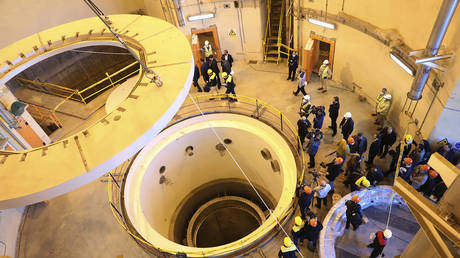Pentagon makes nuclear prediction
Iran’s “breakthrough time” for an atomic bomb has shrunk to just 12 days, the Pentagon’s top policy official told the US Congress

Pentagon makes nuclear prediction

Iran is just 12 away from making enough uranium for an atomic bomb, the Pentagon’s top policy official told Congress on Tuesday. Under Secretary of Defense for Policy Colin Kahl was asked about the defunct nuclear deal with Iran, while testifying at the House Armed Services Committee hearing about arming Ukraine.
“Iran’s nuclear progress since we left the JCPOA has been remarkable,” Kahl said, referring to the 2015 agreement by its acronym. “Back in 2018, when the previous administration decided to leave the JCPOA it would have taken Iran about 12 months to produce one bomb's worth of fissile material. Now it would take about 12 days.”
According to a “confidential” IAEA report, seen by the Associated Press on Tuesday, the United Nations nuclear watchdog’s inspectors had allegedly discovered traces of uranium “particles” enriched up to 83.7% in Iran's underground Fordo nuclear site. However, they found no signs of Tehran actually stockpiling it – in line with Iranian officials' explanation. Behrouz Kamalvandi, spokesman for the Atomic Energy Organization of Iran (AEOI), previously dismissed a similar report by Bloomberg as “slander and a distortion of the facts.”
While US officials and media claim Iran may be on the cusp of producing enough fissile material for a nuclear weapon, the Pentagon reportedly doesn’t believe Tehran has the technology to actually build one.
The agreement, officially known as the Joint Comprehensive Plan of Action (JCPOA), placed severe restrictions on Tehran’s nuclear program in exchange for lifting the UN sanctions. It was signed by Iran, China, Russia, the US, France, Germany, the United Kingdom and the EU. In May 2018, however, US President Donald Trump withdrew from the agreement and reimposed sanctions unilaterally. Iran responded by continuing the program, which Tehran has described as entirely peaceful.
The Joe Biden administration has attempted to revive the deal, but has been unwilling to lift the sanctions or provide Iran with guarantees it would not violate the agreement again. Negotiations have been stalled since August 2022.
“I think there is still the view that if you could resolve this issue diplomatically and put constraints back on their nuclear program, it is better than the other options,” Kahl told lawmakers on Tuesday. “But right now, the JCPOA is on ice.”
On Sunday, Iranian Foreign Minister Hossein Amir-Abdollahian said that the US had sent a message via the Iraqi foreign minister that Washington was “ready to conclude an agreement.” Iran was willing as well, so long as any settlement respected the Islamic Republic’s “red lines,” said Amir-Abdollahian, noting again that it was the US that reneged on the deal.












